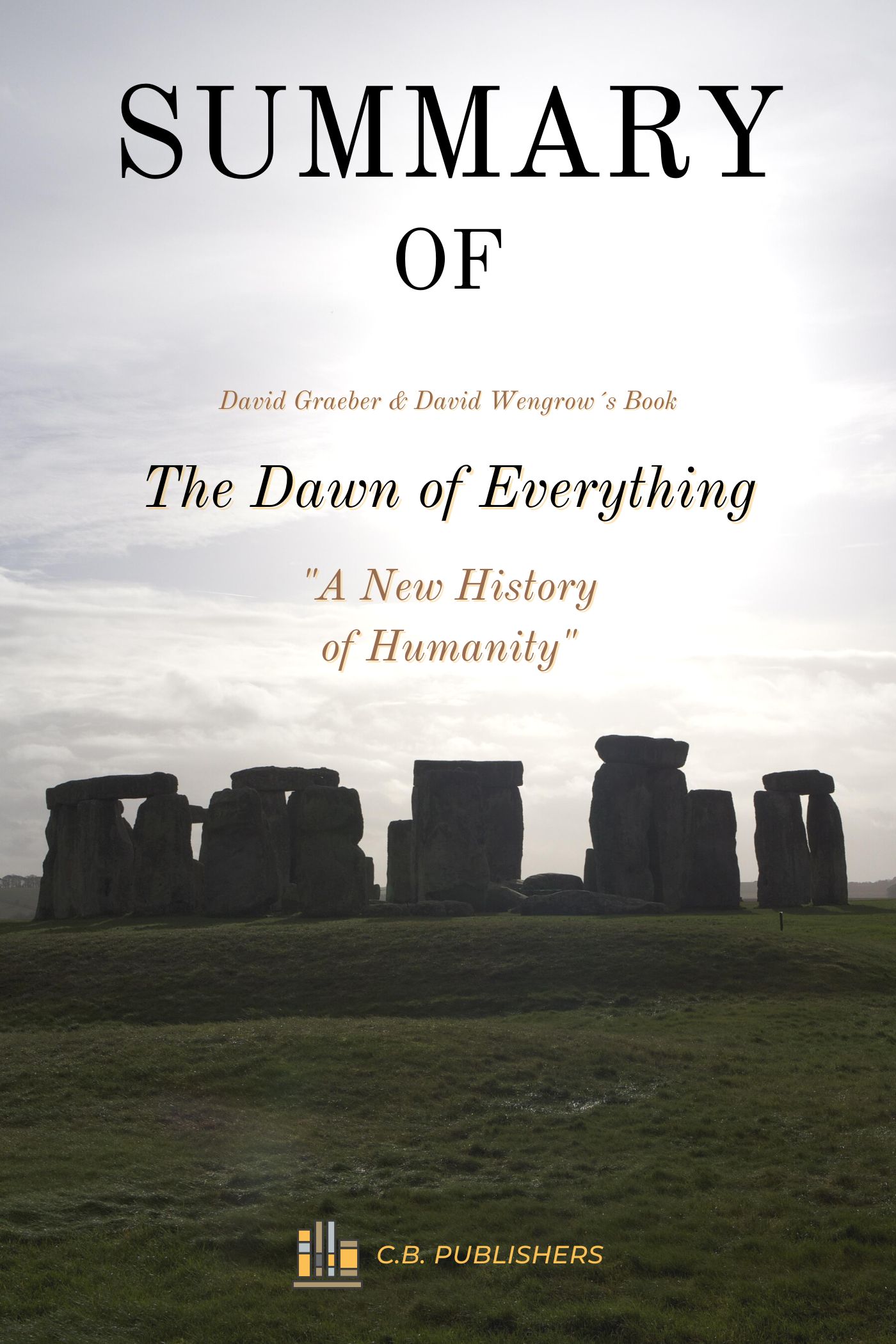The Dawn of Everything Summary
Summary of The Dawn of Everything by David Graeber & David Wengrow
If you are interested in a fresh and provocative perspective on human history and society, then «The Dawn of Everything» by David Graeber and David Wengrow is a must-read. This groundbreaking book challenges traditional theories about the evolution of human societies and offers a compelling new model of human history that emphasizes cooperation, equality, and interconnectedness.
To gain a deeper understanding of the authors’ argument and insights, we recommend reading «The Dawn of Everything Summary.» This concise and accessible guide provides a comprehensive overview of the book’s main ideas and themes, and is perfect for students, scholars, and anyone interested in the study of human culture and society.
By reading «The Dawn of Everything Summary,» you will gain a greater appreciation for the complexities and richness of human history, and will be challenged to rethink your assumptions about the origins and evolution of human societies. Don’t miss this opportunity to engage with one of the most important and thought-provoking books of our time – order your copy of «The Dawn of Everything Summary» today!
The Dawn of Everything Book
«The Dawn of Everything» by David Graeber and David Wengrow is a bold and provocative book that challenges traditional theories about the evolution of human societies. Drawing on evidence from archaeology, anthropology, and other fields, the authors argue that early human societies were more egalitarian, cooperative, and peaceful than commonly believed.
The book opens with a critique of the «standard model» of human history, which posits that early humans lived in small, isolated groups that were constantly at war with one another. According to the authors, this model is based on a narrow and biased reading of the available evidence, which Western cultural biases and assumptions have distorted.
Instead, Graeber and Wengrow propose a new model of human history, which they call the «progressive model.» This model posits that early human societies were characterized by various social and cultural practices, including shared rituals, cooperative labor, and communal decision-making. These practices helped to foster a sense of social equality and collective responsibility and allowed for the development of complex and sophisticated forms of culture and technology.
The authors also argue that early human societies were not divided into distinct «tribes» or «nations,» but rather existed as interconnected networks of people who shared a common culture and identity. These networks were based on social and economic exchange and were sustained by systems of reciprocity and mutual aid.
The book goes on to explore a range of topics, including the origins of agriculture, the rise of the state, and the development of religion and other cultural practices. Throughout, the authors challenge common assumptions and offer a fresh and compelling perspective on the evolution of human societies.
Overall, «The Dawn of Everything» is a groundbreaking and thought-provoking book that challenges conventional ideas about human history and society. It offers a rich and nuanced perspective on the complexities of human culture and society and invites readers to rethink their assumptions about the past, present, and future of our species. Whether you are a student of history, anthropology, or sociology, or simply interested in the human experience, this book is a must-read.
David Graeber Biography
David Rolfe Graeber was an anthropologist and anarchist activist in the United States who lived from February 12, 1961, to September 2, 2020. His work in economic anthropology, particularly his books Debt: The First 5000 Years (2011) and Bullshit Jobs (2018), as well as his role as a leader in the Occupy Wall Street movement, established him as one of the most influential anthropologists and left-wing intellectuals of his generation.
Graeber was born in New York into a working-class Jewish family and attended Purchase College and the University of Chicago, where he earned his Ph.D. in 1996 after conducting anthropological research in Madagascar with Marshall Sahlins.
He was an assistant professor at Yale Institution from 1998 to 2005, when the university controversially chose not to extend his contract before he became eligible for tenure.
He went into «academic exile» in England, working as a lecturer and reader at Goldsmiths’ College from 2008 to 2013, and then as a professor at the London School of Economics beginning in 2013.
He gained a reputation for his caustic and insightful criticism of bureaucracy, politics, and capitalism.
«I counted David as a much-valued friend and ally,» Labour MP John McDonnell wrote. His controversial research and writing exposed us all to new ideas and approaches to political activism. We will all miss him tremendously.»
The historian Rutger Bregman described Graeber as «one of the greatest thinkers of our time and a phenomenal writer,» and the Guardian columnist Owen Jones described him as «an intellectual giant, full of humanity, someone whose work inspired, encouraged, and educated so many.»
Graeber’s editor at Penguin Random House, Tom Penn, described the publishing house as «devastated» and Graeber as «a true radical, a pioneer in everything that he did.»
«David’s inspirational work has changed and shaped people’s perceptions of the world.» His constant, inquisitive curiosity, as well as his wry, sharp-eyed provoking of received nostrums, shine through in his books. «Above all, his singular ability to imagine a better world, born of his own deep and abiding humanity,» Penn said. «We are honored to be his publisher, and we will all miss him: his kindness, warmth, wisdom, and friendship.» His loss is immeasurable, but his legacy is enormous. His legacy and spirit will live on.»
Graeber was born in New York in 1961 to two politically active parents – his father was a member of the International Brigades during the Spanish Civil War, and his mother was a member of the International Ladies’ Garment Workers’ Union – and his adolescent hobby of translating Mayan hieroglyphs first drew academic interest. After studying anthropology at the State University of New York at Purchase and the University of Chicago, he received a coveted Fulbright grant and spent two years conducting anthropological research in Madagascar.
In 2005, a year before he would have been eligible for tenure, Yale declined to extend his contract. After over 4,500 colleagues and students signed a petition in support of Graeber, Yale offered him a year’s paid sabbatical, which he accepted and moved to the UK to work at Goldsmiths before joining LSE. In 2015, he told the Guardian, «I guess I had two strikes against me.» «For one thing, I seemed to be having too much fun at work.» Plus, I’m from the wrong class: I’m from the working class.»
His book Debt: The First 5,000 Years, published in 2011, catapulted him to prominence. Graeber investigated the violence that underpins all monetary social connections and argued for the cancellation of sovereign and consumer debts in it.
Despite dividing critics, it sold well and received praise from everyone from Thomas Piketty to Russell Brand.
Graeber published The Democracy Project: A History, a Crisis, a Movement in 2013, about his involvement with Occupy Wall Street, and The Utopia of Rules: On Technology, Stupidity, and the Secret Joys of Bureaucracy in 2015, inspired by his struggle to settle his mother’s affairs before her death.
His 2018 book, Bullshit Professions: A Theory, was inspired by a 2013 piece titled On the Phenomenon of Bullshit Jobs, in which he claimed that most white-collar jobs were worthless and those technological advancements had led to people working more, not less.
«Huge swaths of people, particularly in Europe and North America, spend their entire working lives performing tasks they believe are unnecessary.»
This situation has caused significant moral and spiritual harm. It has left a scar on our collective soul. «Yet almost no one talks about it,» he told the Guardian in 2015, admitting that his work may be meaningless: «There can be no objective measure of social value.»
Graeber, a lifelong anarchist, supported the Kurdish independence movement and the «amazing democratic experiment» he saw in Rojava, Syria’s autonomous zone.
He became deeply involved in activism and politics in the late 1990s. He was a key figure in the Occupy Wall Street movement in 2011, but he denied coining the phrase «We Are the 99 Percent,» for which he received widespread recognition.
«At first, I proposed that we call ourselves the 99 percent. The ‘we’ was later added by two Spanish indignados and a Greek anarchist, and the ‘are’ was later added by a food-not-bombs veteran. And they say it’s impossible to create something worthwhile by committee! «I’d include their names, but given how police intelligence has been targeting early OWS organizers, it might be best not to,» he wrote.
David Wengrow Biography
David Wengrow (born July 25, 1972) is a British archaeologist and Professor of Comparative Archaeology at the Institute of Archaeology at University College London.
Wengrow earned a BA in archaeology and anthropology from the University of Oxford in 1993. After receiving an MSt in global archaeology in 1998, he went on to complete a D.Phil. under the supervision of Roger Moorey in 2001. Andrew Sherratt was a major influence on Wengrow during his time at Oxford.
From 2001 to 2004, Wengrow was a Henri Frankfort Fellow at the Warburg Institute and a Junior Research Fellow at Christ Church, Oxford. He began working as a lecturer at the University College London Institute of Archaeology in 2004, and he was promoted to Professor of Comparative Archaeology in 2011. (a post formerly held by Peter Ucko). Wengrow has worked on archaeological digs in Africa and the Middle East, most notably with the Sulaymaniyah Museum in Iraqi Kurdistan.
He has published three books and numerous scholarly papers on the origins of writing, ancient art, Neolithic cultures, and the formation of the first Egyptian and Mesopotamian states. In 2020, only three weeks before Graeber’s death, Wengrow, and anthropologist David Graeber finished a book on the history of inequality.

Written by Condensed Books
More From This Category

The Fort Bragg Cartel Review
The Fort Bragg Cartel: An investigative reporter uncovers a web of drug trafficking, murder, and military cover-ups within the US Army's most elite units, sparked by the brutal killing of a Delta Force operator. Drugs, Murder, and the Special Forces' Alleged Cartel...

The Fort Bragg Cartel Review
The Fort Bragg Cartel: An investigative reporter uncovers a web of drug trafficking, murder, and military cover-ups within the US Army's most elite units, sparked by the brutal killing of a Delta Force operator. Drugs, Murder, and the Special Forces' Alleged Cartel...

The Fort Bragg Cartel Review
The Fort Bragg Cartel: An investigative reporter uncovers a web of drug trafficking, murder, and military cover-ups within the US Army's most elite units, sparked by the brutal killing of a Delta Force operator. Drugs, Murder, and the Special Forces' Alleged Cartel...







0 comentarios